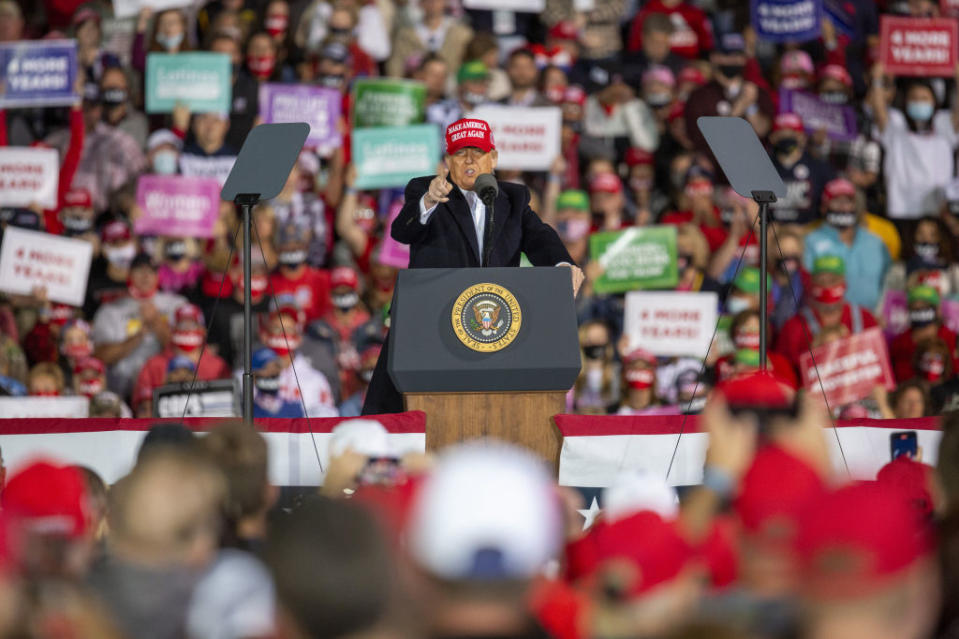'Nightmare scenario': What happens if US election is too tight to call?
With less than three weeks until the US presidential election, a nightmare scenario of chaos, confusion and legal challengers remains a possibility.
Democratic challenger Joe Biden has a commanding lead in national polls but it will likely come down to a few key states while incumbent Donald Trump has repeatedly declined to say whether he would honour a peaceful transition of power.
As many as half of all votes are expected to be from early voting and mail-in ballots, which take much longer to count compared to the machine voting used on the day, adding to the uncertainty of election night on November 3.

If the outcome appears to be so tight that a losing party refuses to concede, then there could be an ugly scenario where the US Congress and the courts ultimately decide the outcome.
“To me the only thing that matters, however produced, is the Electoral College vote,” says Professor Don Debats, head of American Studies at Flinders University.
“Determining the result of an election with voluntary participation, in the middle of a pandemic, with up to 50 per cent of say 150 million votes coming in via postal or early voting makes everything uncertain,” he said.
Speaking to Yahoo News Australia from his office at the University of Virginia, just a two-hour drive from the White House, he explained that if the electoral college outcome is on a knife’s edge, it will come down to the actions of an individual state if the vote count is contested.
“The secretary of state in each state has to certify the vote of each state and that’s the person who can order a recount or partial recount,” he said.
Court disputes arise before George W Bush elected
The most famous example is the 2000 election between Al Gore and George W Bush, when ballot irregularities in Florida led to weeks of chaos and court fights. In December 2000, the Supreme Court ruled to halt a recount and effectively award the presidency to Mr Bush. Al Gore accepted the decision and graciously conceded defeat.
“That was the process that was entered into in Florida,” Prof DeBats said. “There were number of cases in the Florida Supreme Court that were ultimately appealed to the Supreme Court.”
The saga was described as a once-in-a-lifetime event at the time. But given the character of Mr Trump and the hyper partisan politics of today, it could pale in comparison to what’s in store in the coming months, as The New York Times noted in August:
“Imagine not just another Florida, but a dozen Floridas. Not just one set of lawsuits but a vast array of them. And instead of two restrained candidates staying out of sight and leaving the fight to surrogates, a sitting president of the United States unleashing ALL CAPS Twitter blasts from the Oval Office while seeking ways to use the power of his office to intervene.”
This is what has been described broadly in US media as the “nightmare scenario” looming in the coming weeks.
Mail votes could produce a ‘Blue Shift’
When it comes to postal votes, each state runs its own process. In some states, the ballots can be accepted several days after November 3, as long as they are postmarked before polls closed.
And while some states count the ballots as they come in, others — notably the critical battlegrounds of Wisconsin and Pennsylvania — have laws that forbid processing mail ballots until Election Day, guaranteeing the count will extend well past the night.
Given Mr Trump’s efforts to denounce the practice of mail-in voting, polling suggests mail ballots will heavily favour the Democrats. That means on election night it may look good for Donald Trump before a late swing against him – something which has been dubbed the The Blue Shift.

That scenario could aide the president in creating a narrative of illegitimacy – likely by alleging voter fraud – which will be critical if he wants his Republican supporters to contest a state’s vote count.
According to The New York Times, the Joe Biden campaign and its network of Democratic support groups are stocking up on lawyers, and Democrats are gaming out worst-case scenarios, including how to respond if Mr Trump prematurely declares victory or sends federal officers into the party’s strongholds as an intimidation tactic.
Candidates could ‘expand margin of contestation’
A group of academics, political operatives and legal experts called the Transition Integrity Project have also speculated that both candidates could seek to “expand the margin of contestation” if the election proves very close.
Mr Trump would could do this through continuing to allege voter fraud or foreign interference, sowing doubt about the result and heading to the courts.
“Meanwhile, former Vice President Biden may expand the margin of contestation by highlighting voter suppression by the GOP,” the group said.
“Biden may also be able to expand the margin of contestation by questioning the overall legitimacy of a system that doesn’t require the winner to get a majority of the popular vote, or by decrying how President Trump uses the power of the presidency to manipulate the process.”
While “it’s hard to imagine,” Prof Debats said, a similar election to 2000 could see the Supreme Court adjudicating on the process.

Faithless voters of the Electoral College
In the increasingly controversial Electoral College system, voters in each state are actually voting for electors who then cast their vote for the candidate based on the popular vote of that state. Each state is allocated a certain number of electoral votes, depending on its population.
Some states allow for so-called “faithless” electors who can cast a vote at odds with what voters decided. This is exceedingly rare but in 2016 there were seven faithless electors, which was an unusually high number.
“There’s no absolute guarantee that a member of the Electoral College who is casting a vote for their state will necessarily abide by the winner of the popular vote in their state,” Prof Debats said.
“I think that’s a point of vulnerability.”
Electors need to be certified by their state’s executive branch, by either the secretary of state or the governor, depending on the state.
In one plausible albeit unlikely scenario, Mr Trump could convince Republican controlled legislatures to submit seperate slates of electors declaring him the winner. Congress would then have to decide whether to count those electors.

As Mr Trump told his supporters at a Pennsylvania rally in late September: “We have an advantage if we go back to Congress.”
He was referring to the 12th Amendment of the US Constitution which paves the way for Republicans to award the presidency to him in the event no candidate gets a majority of Electoral College votes (270). The wording of the amendment means a majority of state delegations would decide the presidency, giving the edge to the Republicans.
These are all incredibly messy and unlikely scenarios and are up against strict deadlines as the Electoral College meets in mid-December to vote, and Congress is locked in to make the results official in early January.
“The timetable matters in this,” Prof Debats said. “My guess is that the deadline will at the very least, prove as a constraint on any delay.”
If you believe the polls, a substantial Biden victory would render this speculation redundant. But as Prof Debats put it: “It’s American politics – anything can happen.”
Do you have a story tip? Email: newsroomau@yahoonews.com.
You can also follow us on Facebook, Instagram and Twitter and download the Yahoo News app from the App Store or Google Play.





